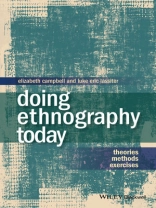Doing Ethnography Today explores the methodologies and theories behind contemporary, collaborative ethnography and provides an opportunity to cultivate experience with included exercises.
• Presents ethnography as creative and artful rather than analytical or technical
• Emphasises the collaborative nature of ethnography
• Structured exercises cultivate practical experience
• Includes a discussion on indexing and interpreting project materials
• Provides guidance on interview questions and selecting appropriate field equipment
Spis treści
Preface x
1 Introduction: Conceptualizing Ethnography 1
Ethnography is as Personal as it Gets 4
Ethnography is Collaborative 5
Ethnography is Hermeneutic 6
Ethnography is Creative and Constitutive 7
Ethnography Grapples with the Idea of Culture, however Deeply Compromised 8
Ethnography is Mostly Art 8
Exercise – Taking Stock: Exploring your Limits and Possibilities 10
Suggested Readings 13
Suggested Websites 14
2 Fields of Collaboration 15
The Field Today 19
On the Actual Complexities of Collaboration 21
Exercise – Engaging Collaborators and Creating Research Questions 24
Suggested Readings 26
Suggested Websites 27
3 Emergent Design 30
Exercise – Intentional Reciprocity 32
Uncertainty and the Collaborative Process 34
Ethics and Ethical Commitments 36
Exercise – Developing Project Codes of Ethics 39
Recognition or Anonymity? 40
Exercise – Ethics, IRBs, and Other Subjects 41
Issues of Authority: Ethnographer as Facilitator, Research Participant as Counterpart 44
Exercise – Revisiting Project Limits and Possibilities 46
Suggested Readings 47
Suggested Websites 48
4 Engagement: Participant Observation and Observant Participation 50
Exercise – One Scene, Many Positions 54
Participation 56
Interlude: Equipment Check 61
From Participant Observation to Observant Participation 64
Fieldnotes: From Definitions, Meanings, and Practices to Storied Observations 66
Exercise – Developing Your Own (Fieldnotes) Style 69
On Fieldnote Forms 72
Exercise – Writing With 75
By Way of Conclusion . . . 77
Suggested Readings 80
Suggested Websites 80
5 Interviews and Conversations 84
Living with Interviews 87
Exercise – Issues for Interviews 89
The Changing Nature of Interviews 94
Exercise – Interviews as Conversations 97
Interviews (and Conversations) in Ethnographic Research 98
Exercise – Talking about Transcripts 104
Suggested Readings 108
Suggested Websites 109
6 Inscriptions: On Writing Ethnography 113
Exercise – Making Sense of Materials 116
“What is Ethnography?” Redux: On the Emergence of Contemporary Ethnographic Forms 120
Exercise – Writing Ethnography 126
Toward Collaborative Writing and Transformation 129
Exercise – Collaborative Writing 131
Suggested Readings 134
Suggested Websites 135
Index 138
O autorze
Elizabeth Campbell is Assistant Professor of Curriculum and Instruction at Marshall University’s College of Education and Professional Development, USA. Before moving to academe, she worked in community development as a folklorist, writer, and museum curator.Luke Eric Lassiter is Professor of Humanities and Anthropology and Director of Marshall University’s Graduate Humanities Program, USA. His books include The Chicago Guide to Collaborative Ethnography (2005) and Invitation to Anthropology (4th edition, 2014). In 2007, he founded the journal Collaborative Anthropologies and served as its editor or co-editor until 2013.












